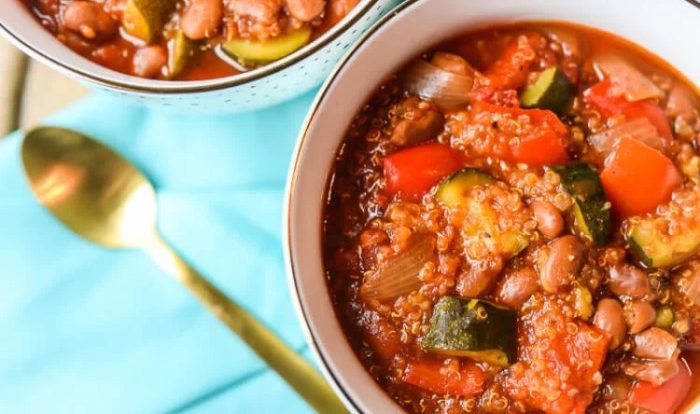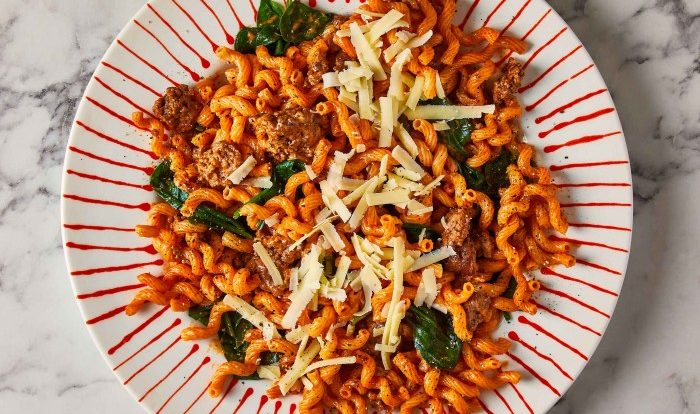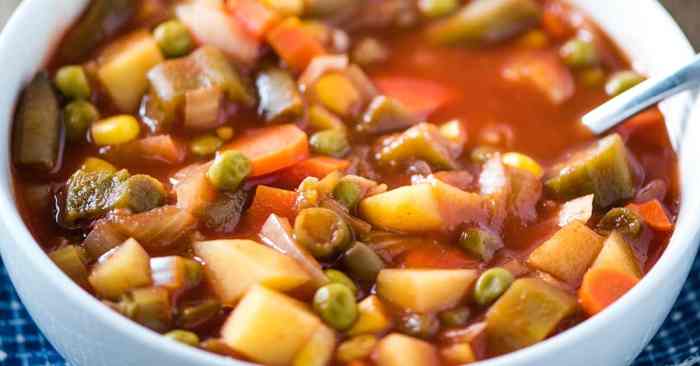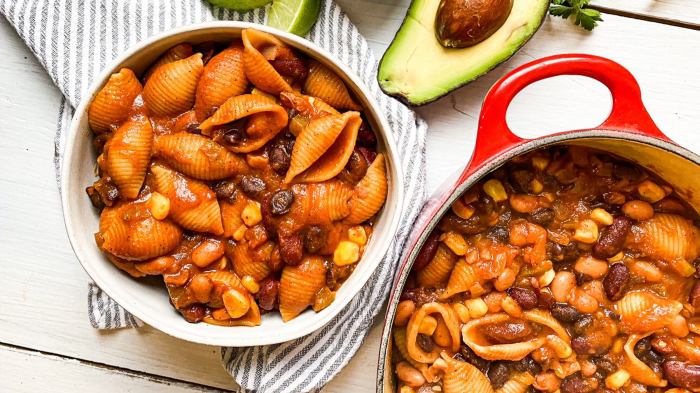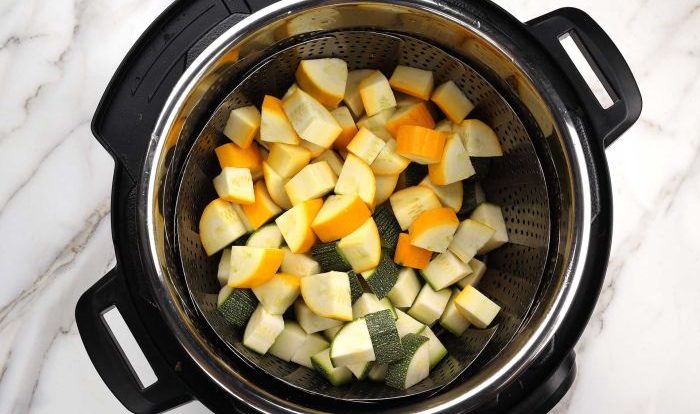Diet oatmeal is a nutritious and versatile grain that can be enjoyed in a variety of ways. From heart health to weight management, oatmeal offers a range of benefits that make it an excellent choice for a healthy diet.
In this comprehensive guide, we will explore the nutritional value of oatmeal, discuss the different types available, and provide tips for cooking it perfectly. We will also share a variety of recipes, including sweet and savory options, and discuss how oatmeal can fit into a healthy diet.
Overview of Oatmeal
Oatmeal is a whole grain cereal made from rolled oats, which are flattened oat groats. It is a popular breakfast food, and for good reason. Oatmeal is a good source of fiber, protein, and vitamins. It is also low in fat and calories.
There are many different types of oatmeal available, including instant oatmeal, rolled oats, and steel-cut oats. Instant oatmeal is the quickest and easiest to prepare, but it is also the least nutritious. Rolled oats take a little longer to cook, but they are more nutritious than instant oatmeal.
Steel-cut oats are the most nutritious type of oatmeal, but they also take the longest to cook.
Oatmeal can be cooked in a variety of ways. It can be cooked on the stovetop, in the microwave, or in a slow cooker. It can also be baked into muffins, cookies, and other treats.
Nutritional Value of Oatmeal
- Oatmeal is a good source of fiber, which is important for digestive health.
- Oatmeal is also a good source of protein, which is essential for building and repairing tissues.
- Oatmeal is a good source of vitamins, including vitamin B1, vitamin B2, and vitamin B6.
- Oatmeal is also low in fat and calories, making it a good choice for people who are trying to lose weight.
Tips for Cooking Oatmeal
- Use 1 cup of liquid (water, milk, or broth) for every 1/2 cup of oats.
- Bring the liquid to a boil, then add the oats.
- Reduce heat to low and simmer for 5-10 minutes, or until the oats are cooked through.
- Stir the oatmeal occasionally to prevent it from sticking to the pot.
- Add your favorite toppings, such as fruit, nuts, or sweeteners.
Health Benefits of Oatmeal: Diet Oatmeal
Oatmeal is a nutritious grain that offers a range of health benefits. It is a good source of soluble fiber, which has been shown to have several positive effects on the body, including improved heart health, weight management, and blood sugar control.
Heart Health Benefits
The soluble fiber in oatmeal can help to lower cholesterol levels and reduce the risk of heart disease. Soluble fiber binds to cholesterol in the digestive tract and prevents it from being absorbed into the bloodstream. This can help to lower LDL (bad) cholesterol levels and raise HDL (good) cholesterol levels.
Weight Management
Oatmeal is a filling food that can help to promote weight loss. The soluble fiber in oatmeal helps to slow down digestion and absorption of food, which can help to keep you feeling full longer. This can lead to reduced calorie intake and weight loss.
When it comes to diet oatmeal, it’s all about finding the right balance of nutrients. If you’re looking for a sweet treat that won’t derail your diet, try our high protein ice cream recipe . It’s a delicious and healthy way to satisfy your cravings without sacrificing your fitness goals.
And with its high protein content, it will keep you feeling full and satisfied for hours. So next time you’re looking for a diet-friendly dessert, reach for a bowl of oatmeal or our high protein ice cream.
Other Health Benefits
In addition to its heart health and weight management benefits, oatmeal has several other health benefits, including:
- Improved digestion: The soluble fiber in oatmeal can help to improve digestion by promoting regularity and preventing constipation.
- Blood sugar control: Oatmeal has a low glycemic index, which means that it does not cause a rapid spike in blood sugar levels. This can help to improve blood sugar control in people with diabetes or prediabetes.
Recipes and Variations

Oatmeal is a versatile dish that can be enjoyed in many different ways. Here are a few popular recipes and variations:
Sweet Oatmeal Recipes
- Classic Oatmeal:Combine 1 cup rolled oats, 2 cups water or milk, and a pinch of salt in a saucepan. Bring to a boil, then reduce heat and simmer for 5 minutes, or until the oats are tender. Add desired toppings, such as fruit, nuts, or honey.
- Apple Cinnamon Oatmeal:Add 1/2 cup chopped apple and 1/2 teaspoon ground cinnamon to the classic oatmeal recipe.
- Banana Nut Oatmeal:Add 1/2 mashed banana and 1/4 cup chopped nuts to the classic oatmeal recipe.
- Peanut Butter and Jelly Oatmeal:Top classic oatmeal with 2 tablespoons peanut butter and 1 tablespoon jelly.
Savory Oatmeal Recipes
- Oatmeal with Cheese and Ham:Add 1/2 cup shredded cheddar cheese and 1/4 cup chopped ham to the classic oatmeal recipe.
- Oatmeal with Vegetables:Add 1/2 cup chopped vegetables, such as bell peppers, onions, or mushrooms, to the classic oatmeal recipe.
- Oatmeal with Eggs:Add 1 egg to the classic oatmeal recipe and cook until the egg is set.
Overnight Oats
Overnight oats are a convenient way to enjoy oatmeal without having to cook it in the morning. Simply combine 1/2 cup rolled oats, 1 cup milk or yogurt, and desired toppings in a jar or container. Place in the refrigerator overnight and enjoy in the morning.
Toppings and Mix-Ins
There are endless possibilities when it comes to toppings and mix-ins for oatmeal. Here are a few ideas:
- Fruit: berries, bananas, apples, peaches, etc.
- Nuts: almonds, walnuts, pecans, etc.
- Seeds: chia seeds, flax seeds, hemp seeds, etc.
- Sweeteners: honey, maple syrup, agave nectar, etc.
- Spices: cinnamon, nutmeg, ginger, etc.
- Protein powders
- Peanut butter or other nut butters
- Yogurt
Meal Planning and Diets
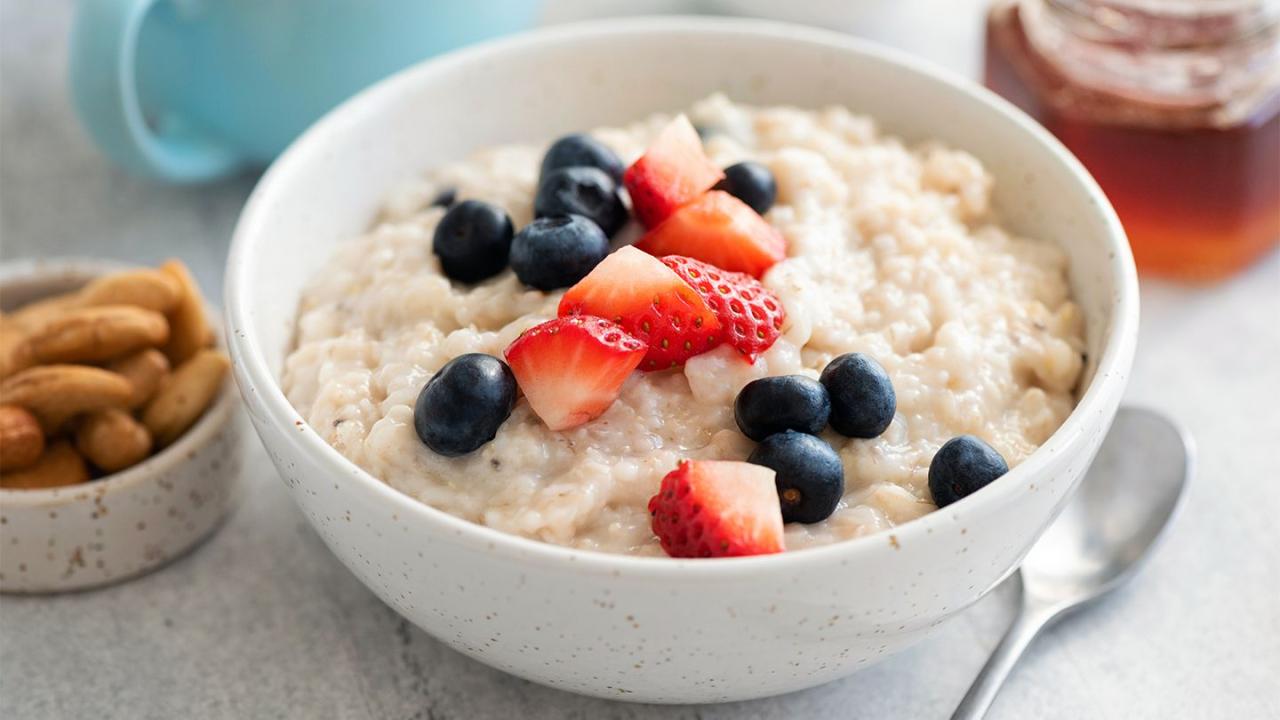
Oatmeal is a versatile grain that can be incorporated into various healthy diets. Its high fiber content promotes satiety, helping you feel fuller for longer and potentially reducing overall calorie intake.
To incorporate oatmeal into your diet, consider the following meal planning tips:
Breakfast, Diet oatmeal
- Pair oatmeal with fruits, nuts, and seeds for a nutrient-rich breakfast.
- Prepare overnight oats with milk or yogurt for a quick and easy grab-and-go option.
- Add oatmeal to smoothies for a fiber boost and creamy texture.
Lunch
- Use oatmeal as a base for savory bowls, topped with grilled vegetables, beans, and lean protein.
- Create oatmeal-based salads with fresh vegetables, herbs, and a light dressing.
- Substitute rice or pasta with oatmeal in soups and stews.
Dinner
- Prepare oatmeal as a side dish to accompany grilled fish, chicken, or tofu.
- Use oatmeal as a thickening agent in soups, sauces, and gravies.
- Create oatmeal-based casseroles or baked dishes with vegetables, cheese, and lean meats.
Weight Loss or Maintenance
Oatmeal can be a valuable addition to weight loss or maintenance diets. Its high fiber content promotes satiety, helping you consume fewer calories throughout the day.
When incorporating oatmeal into a weight loss diet, consider the following tips:
- Opt for plain or steel-cut oatmeal instead of flavored or instant varieties.
- Limit added sugars and fats, such as honey or butter.
- Pair oatmeal with lean protein and vegetables for a balanced meal.
Summary
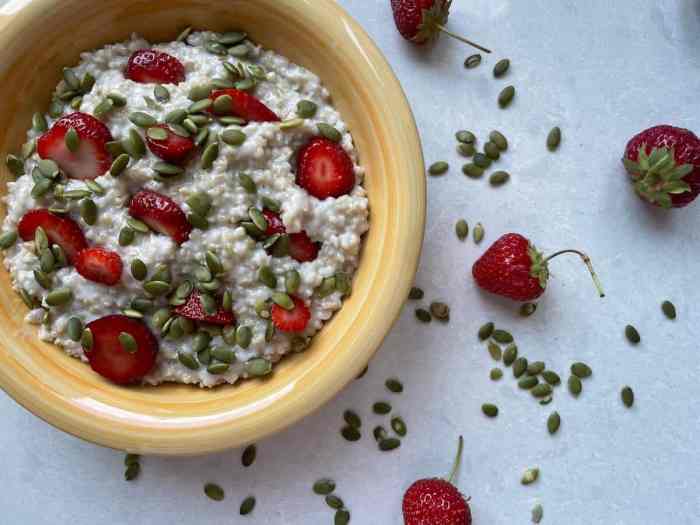
Whether you are looking to improve your heart health, manage your weight, or simply enjoy a delicious and nutritious meal, diet oatmeal is a great option. With its versatility and range of health benefits, oatmeal is a food that deserves a place in everyone’s diet.



